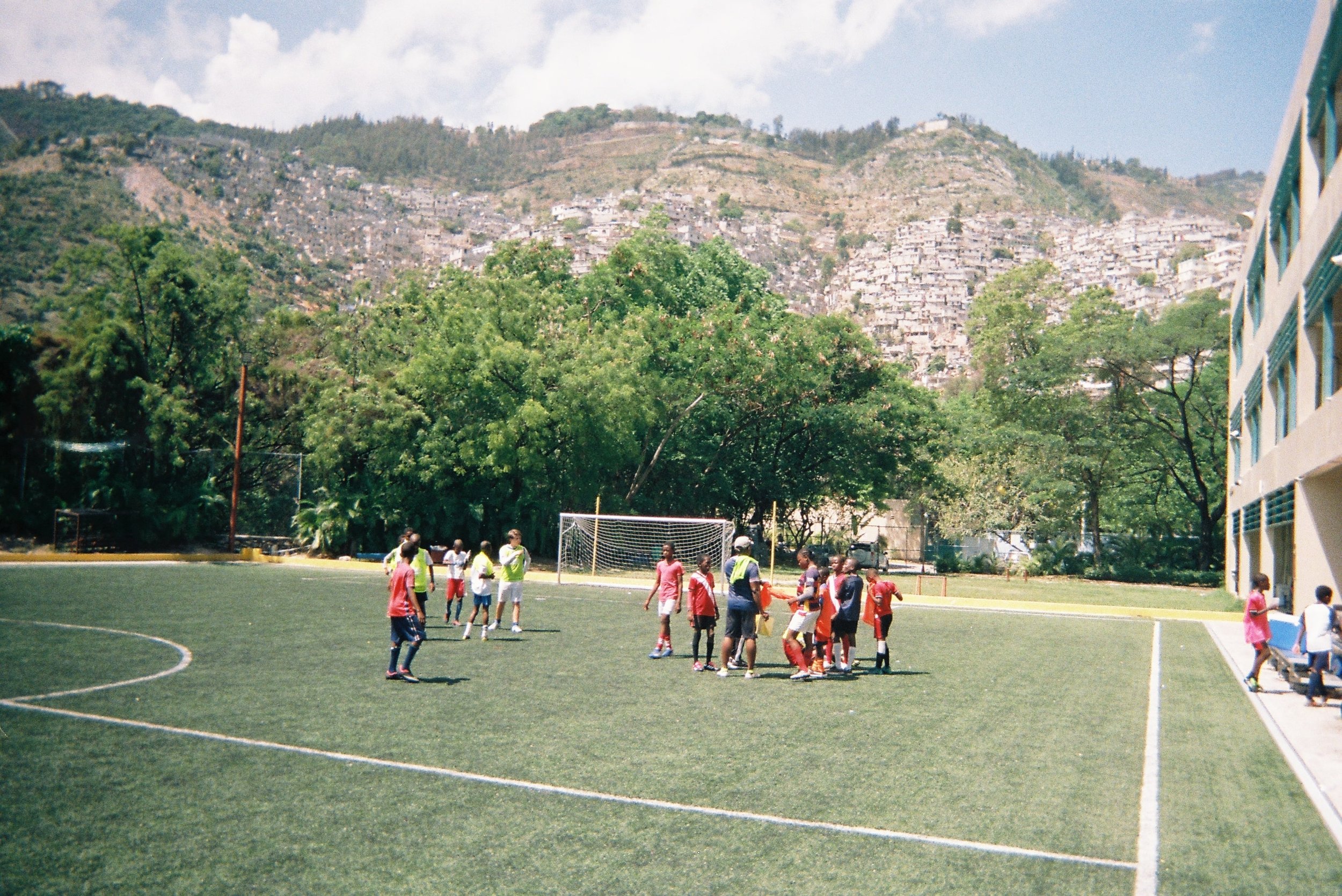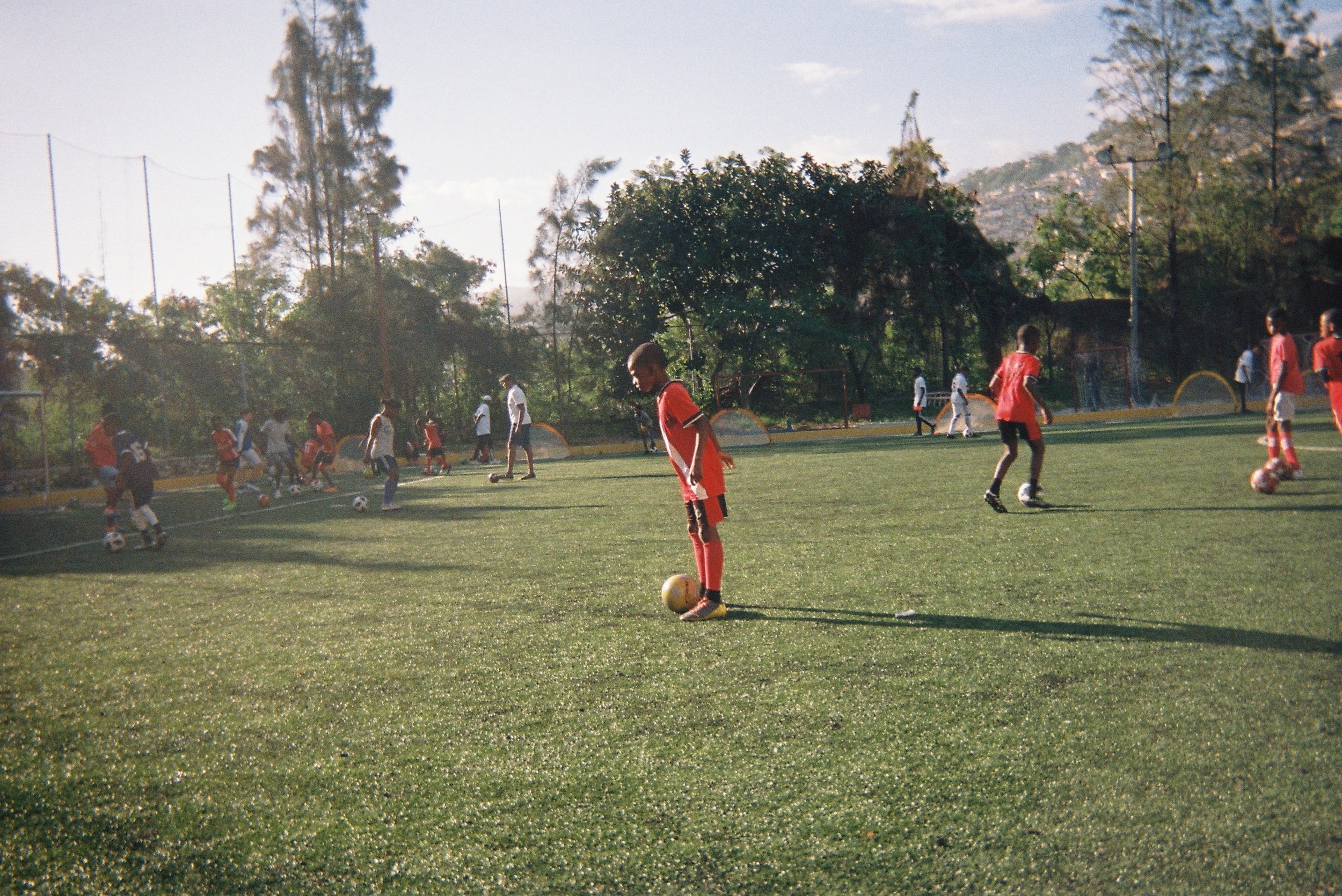The Haitian Football Future
James Louis-Charles, Haiti
My name is James Louis-Charles. I am in my 40s, and I live in Port-au-Prince, Haiti. I am the Founder and Director of FC Juvenat, and we practice once a week.
I have been interested in soccer since an early age. One of my earliest memories is listening to my father talk about the day Haiti made it to the 1974 World Cup. Everytime he told that story, it was the happiest I ever saw him. So as a kid I thought I was going to be the next one to get Haiti back to the World Cup to make my dad happy. I do not think my dad liked the fact I was neglecting my studies to play street soccer though!
What has your football journey been like up until now?
When I moved to the USA, I played high school soccer at Paint Branch High School in Burtonsville, Maryland, then college soccer at Montgomery College in Maryland. Eventually after university I made it onto the D3 semi-pro team Northern Virginia Royals, which was at the time affiliated with the MLS team DC United.
When I started to have knee problems, I transitioned to becoming a coach. This is where the idea of returning back to Haiti and creating safe spaces and opportunities for both boys and girls to play soccer started. I moved back to Haiti in 2016 and started FC Juvenat in January 2023 for kids aged 6-15.
I remembered when I played street soccer in Haiti, there were more talented kids than me. Who knows how far they could have gone if they had the same opportunities I had in the USA?
What did you try to show with the photos? Was there any wider meaning with the photos?
The kids in the photos are from the FC Juvenat soccer program I started for the community that it is named after. As you might see, across the street from the soccer field is Juvenat, one of the biggest slums that you will see in the capital Port-au-Prince, and it is located on the side of the mountains. Most of the kids in our soccer program live there.
The photos were taken at Union School Haiti, which is where I work as an Athletic Director and a social studies teacher. The school has donated the use of the soccer field to run the program, and the parents of the Union School community contribute the food for the FC Juvenat kids to have after practice.
I tried to show how much fun the kids are having on the field. Haiti has been going through some hard times for a while. 75% of the capital has been overrun by dangerous gangs, and as such, there are not many fun and safe activities kids can do in the capital these days. I live on the edge of a neighborhood with serious security issues, and I hear gunshots daily. We are fortunate that the gang situation has not affected Juvenat as much. For some of these kids, being on this field once a week is the highlight of their week.
What is your favorite photo? Why?
You can see four boys together, taken during a visit to one of the boys in the program. His name is Clyde and he lives up in the slum across the street. You have no idea how big the slum is. The slum wraps around the side of the mountain, and to get to Clyde's house, I had to go up what seems to be never-ending stairs. The stairs are the only way in and out of the slums, and I had to stop a few times going up to his house.
The camaraderie that I saw between the boys off the soccer field reminded me of my childhood, because my closest friends growing up in Haiti were the kids with whom I played street soccer.
Are there any good stories connected with the people you photographed?
Clyde is one of our talented boys at the U13 category. He is such a nice kid, and you can tell that his parents are proud of him. He does well in school and he is very respectful also. His parents are hoping that through soccer, many opportunities to succeed will be available for him, which is unfortunately not the case for most kids in Haiti.
What impact has playing and coaching football had on you?
To move back to Haiti during those difficult times has not been easy. Many people think I am crazy for coming back while people are trying to leave the country. In fact, many of my friends did leave. I do not have much of a social life here because the streets are practically deserted after dark due to the insecurity. However, seeing the kids having fun on the soccer field gives me a sense of purpose. That alone makes me realize the impact of coaching soccer here has had on everyone, and that makes me happy.
What role does football play in your community and in Haiti?
Haitians go crazy for soccer. Unfortunately due to the security situation, our soccer has not progressed as much as we would like. The Haiti men's national team has a lot of potential, but they are very unpredictable. In addition, they have not played in Haiti for two years now due to the insecurity. Most of our home games for international matches have been somewhere else in the Caribbean. As such, it is very difficult for people to fully support the national team.
The Haiti women's national team is slowly getting a bigger following because they qualified for their first Women's World Cup last summer, which is a very big deal here. In addition, one of the most promising young women’s players in the world right now is Haitian, and her name is Melchie Dumornay.
What are the opportunities for women and girls to play in your community?
Because of the success of Melchie Dumornay, more and more girls are playing soccer in Haiti. However, as the security situation deteriorates, there are less safe fields for kids to play on. FC Juvenat is important because we offer a safe environment for our players to play soccer, especially for the girls in our community.
In fact, we have a few girls that come from another community 30 minutes away called Delmas to play soccer with us. The part of Delmas they come from is known for being dangerous because of gang attacks. To get to Juvenat, they have to take at least two buses.
What does football mean to you? What ambitions do you have for the future?
I love the work we are doing, but FC Juvenat is not only about soccer. We use purposeful play and education programs to address critical issues, such as conflict resolution, gender equality and social inclusion within our community.
One of my ambitions for the future is to build a soccer academy so that kids in Haiti can reach their dreams of playing for a big European team one day, or get athletic scholarships so they can use soccer to obtain a higher education in the USA.
Secondly, I would like to use soccer as a launching pad for not only social but also economic development in Haiti. Haiti has so much more to offer the world historically and culturally. It is my dream that with the new co-hosting format of the World Cup, Haiti can co-host the World Cup one day with others in the Caribbean. It may seem crazy, but first you have to dream it.
What is the future for football in Haiti? What would you like to change?
Currently the local domestic soccer league of Haiti is on hiatus due to the security situation. We hope that when the country is stable enough to re-launch the professional soccer league, there will be more investments in infrastructure, and that more professional soccer clubs create academies to give our kids more opportunities. 50% of the population of Haiti is under the age of 25 years. It is a young country with a passion for soccer, with lots of talents that are waiting to be discovered and developed.




















